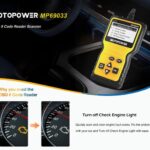When it comes to maintaining your car’s braking system, especially one equipped with Anti-lock Braking System (ABS), understanding the right tools is crucial. If you’re wondering “What Kind Of Scanner Can Scan Car Abs Brake System?”, you’re in the right place. While simple brake fluid changes might not always require advanced tools, dealing with the ABS system often necessitates a specific type of scanner to ensure optimal performance and safety.
For routine brake fluid maintenance, like preparing for track days or regular servicing, a manual brake bleed might suffice. This traditional method involves opening bleed screws and manually pumping the brake pedal to remove old fluid. In these cases, following the correct bleed sequence, typically Rear Right (RR), Left Front (LF), Left Rear (LR), and Right Front (RF) for cross-split systems, is key. This method works because fresh fluid is introduced without significantly disturbing the ABS module.
However, the situation changes when air enters the ABS module itself. This can happen if the system is fully drained or if air is introduced during repairs. In such scenarios, a specialized scan tool becomes essential. These scanners are designed to communicate with your car’s ABS module and activate its internal pump and valves. This process, often called an “auto bleed” or “ABS bleed,” forces fluid through the ABS module, effectively purging any trapped air.
These ABS scan tools typically guide you through a step-by-step procedure displayed on their screen. The process usually involves opening specific bleed screws at each wheel while the scanner cycles the ABS system. For front calipers with inner and outer bleed screws, it’s advisable to use the ABS tool procedure on the inner screw and then perform a couple of manual bleeds on the outer screw to guarantee all old fluid and potential air are removed from the entire caliper.
In summary, while manual bleeding is adequate for regular brake fluid changes, an ABS scan tool is indispensable when dealing with air in the ABS module. These scanners ensure a thorough bleed, maintaining the integrity and safety of your car’s ABS brake system. Choosing the right scanner capable of ABS functions is a worthwhile investment for comprehensive brake system maintenance.

